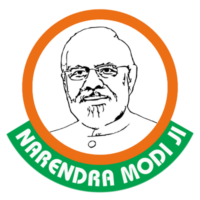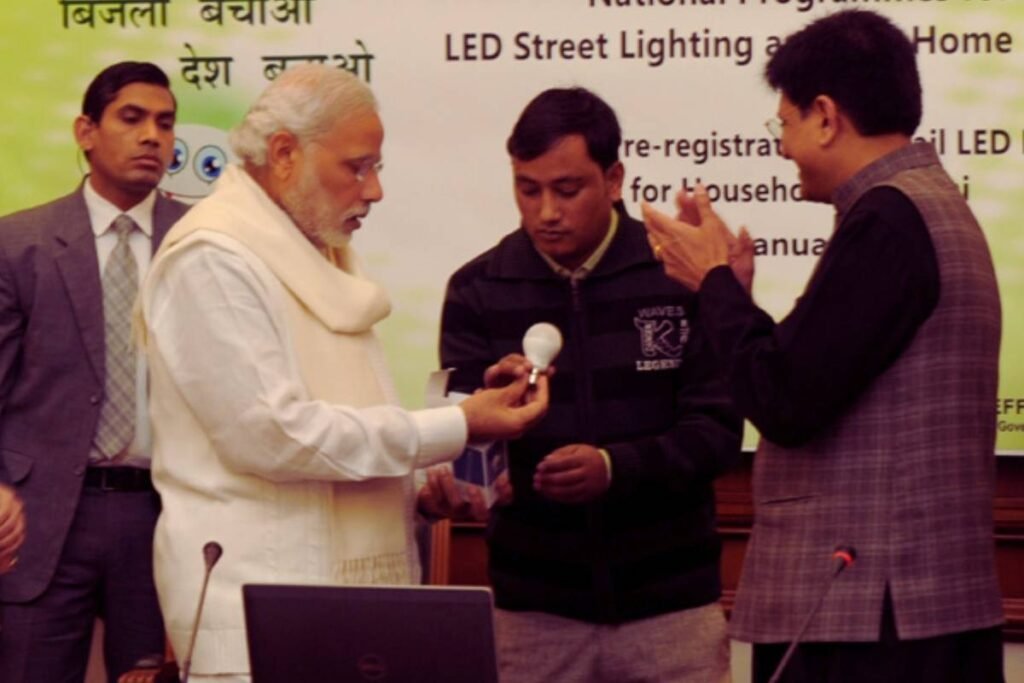The Unnat Jyoti by Affordable LEDs for All (UJALA) scheme is a transformative initiative launched by the Government of India on May 1st 2015 under the leadership of Prime Minister Narendra Modi. This scheme aims to revolutionise India’s lighting landscape by promoting energy-efficient LED bulbs “Prakash Path” – “way to light and other appliances, thereby contributing to energy conservation, cost savings, and environmental sustainability.
India has been grappling with significant energy challenges, including high electricity consumption, inefficient lighting systems, and environmental concerns. Traditional incandescent bulbs consume large amounts of electricity and contribute to greenhouse gas emissions. Recognising the need for a sustainable solution, Prime Minister Narendra Modi introduced the UJALA scheme as part of the government’s commitment to promoting energy efficiency and clean energy.

Key Objectives:
- Promoting Energy Efficiency: The primary objective of the UJALA scheme is to promote energy efficiency by encouraging the adoption of LED bulbs, which consume up to 80% less energy than traditional incandescent bulbs.
- Cost Savings for Consumers: By providing LED bulbs at subsidized rates, the scheme aims to reduce electricity bills for households and institutions, leading to significant cost savings in the long run.
- Environmental Sustainability: By reducing electricity consumption and greenhouse gas emissions, the UJALA scheme contributes to environmental sustainability and mitigates climate change.
The UJALA scheme is implemented through a decentralised distribution model, with LED bulbs being distributed through designated distribution centres across the country. These bulbs are made available to consumers at affordable prices, thanks to government subsidies and bulk procurement. Additionally, awareness campaigns and promotional activities are conducted to educate consumers about the benefits of energy-efficient lighting.
Achievements and Impact: Since its launch, the UJALA scheme has made significant strides in transforming India’s lighting landscape. Here are some key achievements and impacts:
- Distribution of over 36.13 crore LED bulbs, resulting in energy savings of approximately 47.38 billion kWh per year.
- Reduction of approximately 38.63 million tonnes of CO2 emissions, equivalent to planting over 100 crore trees.
- Cost savings of over Rs. 24,000 crore annually for consumers through reduced electricity bills.
- Empowerment of citizens with access to affordable and energy-efficient lighting solutions, improving their quality of life.
Prime Minister Narendra Modi’s Vision: Prime Minister Narendra Modi’s vision and leadership have been instrumental in driving the success of the UJALA scheme. His unwavering commitment to promoting clean energy and sustainability has laid the foundation for transformative initiatives like UJALA, which align with India’s development goals and global climate commitments.
The UJALA scheme stands as a shining example of India’s commitment to promoting energy efficiency, sustainability, and inclusive development. Through innovative policies, strategic implementation, and strong leadership, the scheme has made significant strides in transforming India’s lighting landscape and contributing to the nation’s journey towards a greener, brighter future.
Why LED bulbs?
The UJALA scheme focuses on the distribution of LED bulbs because the light-emitting diode (LEDs) provide better light output by consuming only one-tenth of the energy as compared to any ordinary bulb. This scheme also aims in distributing 20W LED tube lights to the consumers which are 50% more energy-efficient than the regular 40W tube lights. But, the high cost of these LEDs has been a barrier to the adoption of such efficient lighting systems. The DELP on-bill financing scheme proposes to overcome this cost barrier as these LED bulbs are highly efficient in the reduction of load, consumer bills, the greenhouse gas emissions and in saving the electricity.

